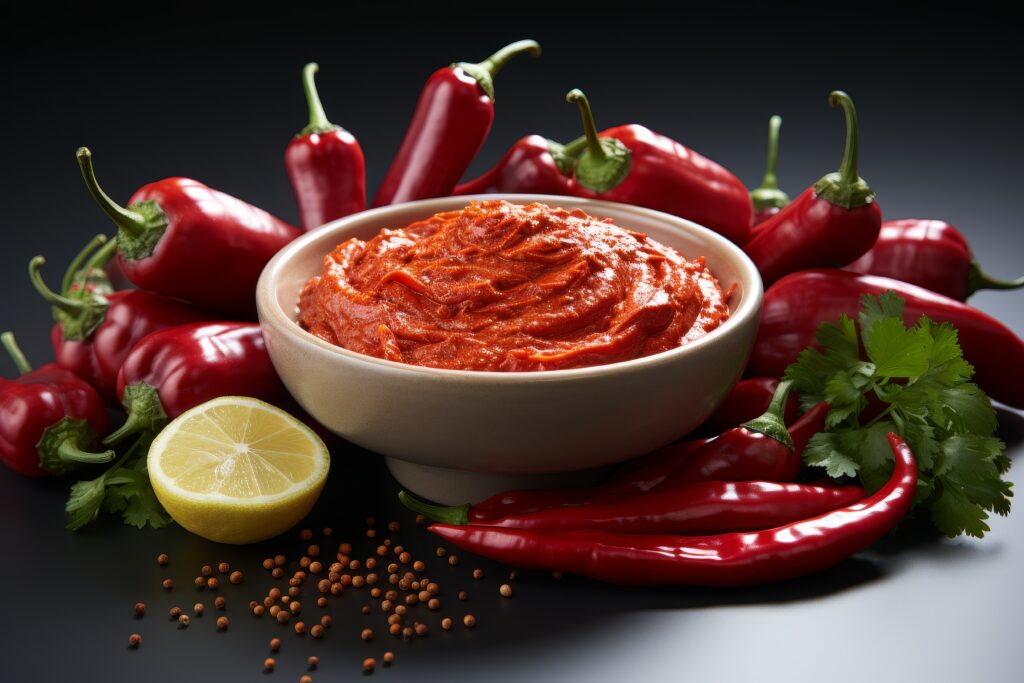
Muhammara: The Exquisite Red Pepper and Walnut Dip
Muhammara, a luxurious and flavourful dip made from roasted red peppers and walnuts, hails from the vibrant culinary traditions of the Middle East. Originating in Aleppo, Syria, this smoky, nutty, slightly spicy dip has become a beloved component of mezze spreads worldwide. Chef Abdul, renowned for his expertise in Middle Eastern cuisine, takes us through Muhammara's history, preparation, and variations. Whether served as a dip, spread, or sauce, Muhammara is a versatile dish that brings warmth and depth to any meal.
The Origins of Muhammara
Muhammara’s roots are in the ancient city of Aleppo, which is famous for its culinary innovations and use of vibrant spices. The word “Muhammara” translates to “reddened” in Arabic, a nod to its signature deep red hue derived from roasted red peppers and Aleppo pepper flakes. Traditionally, Muhammara was crafted using locally grown ingredients, making it a dish that encapsulates the essence of its region.
Uses of Muhammara
- As a Dip: Perfect for scooping with warm pita bread, flatbreads, or fresh vegetables.
- As a Spread: Adds depth and flavour to sandwiches, wraps, and burgers.
- As a Sauce: Pairs beautifully with grilled meats, seafood, or roasted vegetables.
- In Mezze Platters: Complements other Middle Eastern dips like hummus and baba ganoush.
- In Fusion Cuisine: Incorporate into pasta sauces or use as a pizza base for a unique twist.
“Muhammara is incredibly versatile and pairs well with almost any dish,” says Chef Abdul. “Its rich, smoky flavour profile elevates even the simplest of meals.”
Storing Muhammara
Store Muhammara in an airtight container in the refrigerator for up to a week. For longer storage, freezing is an option; however, fresh Muhammara always tastes best. Chef Abdul recommends covering the surface with olive oil before sealing the container to retain its vibrant flavour.
Ingredients
- 3 large red bell peppers
- 100 grams walnuts, toasted
- 50 grams breadcrumbs
- 2 tablespoons olive oil (plus extra for garnish)
- 1 tablespoon pomegranate molasses
- 1 teaspoon ground cumin
- 1 teaspoon Aleppo pepper flakes (or red chilli flakes as a substitute)
- 2 cloves garlic, minced
- Salt and pepper to taste
- Optional: Fresh parsley or pomegranate seeds for garnish
Method:
- Roast the red bell peppers over an open flame, grill, or in the oven until the skin is charred and blistered. Cover in a bowl, and let steam for 10 minutes to loosen the skin. Peel off the skin, remove the seeds and stems, and set aside the flesh.
- In a food processor, combine the roasted peppers, walnuts, breadcrumbs, olive oil, pomegranate molasses, cumin, Aleppo pepper flakes, and garlic. Blend until smooth.
- Season with salt and pepper to taste. Drizzle olive oil over the mixture to adjust the consistency.
- Transfer to a serving bowl, drizzle with olive oil, and garnish with parsley or pomegranate seeds.
“The secret to an authentic Muhammara lies in balancing the smoky, nutty, and tangy flavours,” Chef Abdul advises. “Don’t skip the pomegranate molasses—it’s the heart of this dish.”
Variations of Muhammara
- Spicy Version: Add extra Aleppo pepper flakes or a dash of cayenne for more heat.
- Nut-Free Option: Replace walnuts with sunflower seeds or omit them entirely.
- Herbed Twist: Incorporate fresh herbs like mint or cilantro for added freshness.
- Creamy Muhammara: Blend in a dollop of Greek yoghurt or tahini for a creamier texture.
- Fruit-Enhanced: Add dried figs or dates for a hint of sweetness.
Famous Restaurants Serving Muhammara
- Sufra, Hyderabad: Known for its authentic Levantine dishes, including a perfectly balanced Muhammara.
- Bayroute, Mumbai: Offers a luxurious Mediterranean dining experience with Muhammara as a standout dip.
- Zizo, Delhi: Renowned for its mezze platters featuring creamy and flavourful Muhammara.
- Fig & Olive, Pune: Celebrated for its artisanal approach to Mediterranean cuisine, including this smoky dip.
- The Lebanese Point, Chennai: Known for its vibrant and fresh Muhammara served with warm pita bread.
Conclusion
Muhammara is more than just a dip; it celebrates Middle Eastern culinary artistry. Chef Abdul’s insights and recipe bring this dish to life, making it accessible for anyone to recreate at home. Whether exploring the Levant’s flavours or adding a gourmet touch to your meals, Muhammara is a must-try.
As Chef Abdul puts it, “Muhammara tells a story of tradition, flavour, and creativity. It’s a dish that delights the senses and warms the soul.”

